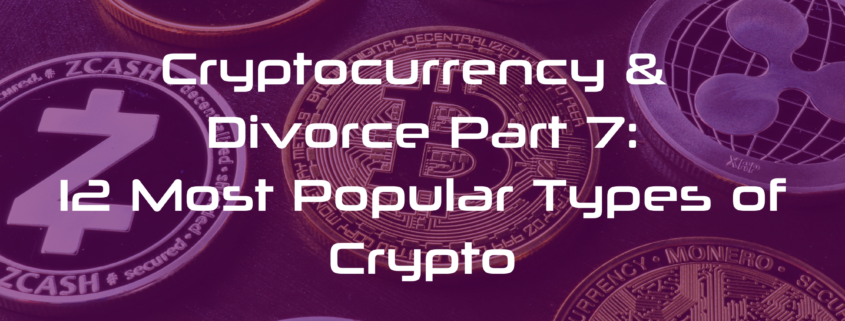Cryptocurrency Series: 12 Most Popular Types of Crypto and What to Know Before Divorce.
Cryptocurrency is by design difficult to trace, making it an ideal asset to hide from a spouse. If you’re new to the world of Crypto, it gets even more challenging. Here’s a list of the most popular cryptos to look out for and how to include them in your divoce settlement.
If you’ve been following our Crypto and Divorce series you may already be aware of the difficulties crypto assets bear in divorce. As a quick recap, we’ll be covering what Cryptocurrency is as well as the 12 most popular types of crypto in the market.
With all of these forces at play during a divorce, it’s best to be prepared for whatever the outcome may be and hiring a family law attorney well-versed in cryptocurrencies is always an advantage. Here’s what you need to know about the 12 most popular types of Cryptocurrencies and how you can best prepare for them before divorce.
Cryptocurrency is a digital form of payment that can be used to purchase goods or services online. Every transaction is done online and tracked via a highly secure ledger called a blockchain. Let’s jump into some of the various types of crypto there is on the market.
- Bitcoin (BTC)
Notably known as the most popular form of crypto, Bitcoin is widely known as the first major cryptocurrency to hit the market. It first debuted in 2009 and many others have become popular but not as popular as the original.
Bitcoin is still the coin people generally reference when they talk about digital currency. Its mysterious creator — allegedly Satoshi Nakamoto — debuted the currency in 2009 and it’s been on a roller-coaster ride since then. However, it wasn’t until 2017 that the cryptocurrency broke into popular consciousness.
- Ethereum (ETH)
Ethereum is the second name you’re most likely to recognize in the crypto space. The system allows you to use ether to perform a number of functions, but the smart contract aspect of Ethereum helps make it a popular currency.
Ether is used mainly for two purposes: It is traded as a digital currency on exchanges in the same way as other cryptocurrencies, and it is used on the Ethereum network to run applications. According to Ethereum, “people all over the world use ETH to make payments, as a store of value, or as collateral.”
- Tether (USDT)
Tether’s price is anchored at $1 per coin. That’s because it is what’s called a stablecoin. Stablecoins are tied to the value of a specific asset, in Tether’s case, the U.S. Dollar. Tether often acts as a medium when traders move from one cryptocurrency to another. Rather than move back to dollars, they use Tether. However, some people are concerned that Tether isn’t safely backed by dollars held in reserve but instead uses a short-term form of unsecured debt.
- Binance Coin (BNB)
Binance Coin is the cryptocurrency issued by Binance, among the largest crypto exchanges in the world. While originally created as a token to pay for discounted trades, Binance Coin can now be used for payments as well as purchasing various goods and services.
- USD Coin (USDC)
Tether and USD Coin are both stablecoins that are attached to the dollar, meaning that its value should not fluctuate. The currency’s founders say that it’s backed by fully reserved assets or those with “equivalent fair value” and those assets are held in accounts with regulated U.S. institutions.
- Ripple (XRP)
Formerly known as Ripple and created in 2012, XRP offers a way to pay in many different real-world currencies. Ripple can be useful in cross-border transactions and uses a trust-less mechanism to facilitate payments.
Ripple is known for their advanced blockchain technology for global payments. Where financial institutions are able to expand into new markets around the world and eliminate pre-funding by leveraging the power of XRP.
- Solana (SOL)
Solana was created in 2017 by Anatoly Yakovenko alongside current Solana board member and Chief Operations Officer Raj Gokal. Yakovenko, now Solana Lab’s CEO, came from a background in system design and wanted to apply his knowledge toward a new blockchain paradigm that enabled faster processing speeds.
Solana is a newer cryptocurrency and it touts its speed at completing transactions and the overall robustness of its “web-scale” platform. The issuance of the currency, called SOL, is capped at 480 million coins. Solana’s increasing popularity has made it Ethereum’s growing rival.
- Terra (LUNA)
Using its currency Luna, Terra is a platform that helps backstop a range of stablecoins based on real currencies such as the dollar or euro. Terra helps stabilize the price of stablecoins through various technical means, and it also supports smart contracts.
According to the Terra website, the Terra protocol creates stablecoins that track the price of any fiat currency using a combination of open market arbitrage incentives and decentralized Oracle voting. On the Terra blockchain, users may spend, save, trade, and swap Terra stablecoins.
- Cardano (ADA)
Cardano is the cryptocurrency platform behind ada, the name of the currency. Cardano is a proof-of-stake blockchain platform: the first to be founded on peer-reviewed research and developed through evidence-based methods. It combines pioneering technologies to provide unparalleled security and sustainability to decentralized applications, systems, and societies. Cardano was created by the co-founder of Ethereum, and this cryptocurrency also uses smart contracts, enabling identity management.
- Avalanche (AVAX)
Avalanche is a fast and low-cost smart contracts-based blockchain platform focused on building decentralized apps and facilitating the creation of custom blockchains. Its users can process transactions in the native AVAX token.
The AVAX token is hard-capped which makes it a scarce asset that is used to pay for fees, and secret the platform through staking. Ultimately the hard cap provides a basic unit of account between the multiple subnets within Avalanche.
- Polkadot (DOT)
Polkadot is a currency that connects blockchains which allows value and data to be sent across other incompatible networks. For example Bitcoin and Ethereum. It’s also designed to be fast and scalable.
The DOT token is used for staking and governance; it can be bought or sold on Coinbase and other exchanges. Polkadot was founded by another co-founder of Ethereum. Industry specialists believe Polkadot is looking to eventually dethrone Ethereum.
- Dogecoin (DOGE)
Dogecoin originated as an alternative to traditional cryptocurrency such as bitcoin. Both the name and logo were based off of a meme that went viral. Dogecoin is intentionally abundant which is different in comparison to bitcoin which is scarce. In 2021, Dogecoin became one of the biggest cryptocurrencies in the market. Dogecoin crypto can be used for payments or sending money.
Divorce and Crypto Assets
Cryptocurrency is considered an asset and as a result, it may be considered separate property or marital property. In some cases, growth in the value of cryptocurrency during the marriage may be considered a marital asset, even if the original purchase took place before the marriage.
This is especially true when both spouses were involved in using cryptocurrency, investing in crypto assets, or planning to rely on crypto to fund future financial ventures. If you’re a crypto investor considering divorce, you should always consult with your lawyer about how you can expect your investments to be affected by the separation.
Bottom Line
The cryptocurrency market could be compared to the Wild West. Although, the U.S. government has been taking on a more active role in overseeing crypto space. Volatility can be intense, with crypto assets fluctuating significantly even in a single day. This leaves individual investors to trade against highly sophisticated players, making it a fraught experience for beginners getting into crypto.
Regardless of your skill level, splitting digital currency may be more complex than traditional investments, such as stocks, bonds, or mutual funds. It is important to be prepared and make sure that crypto is properly discovered and valued in family law matters. If you know or suspect that cryptocurrency will be a part of your divorce, talk to your family law attorney immediately and put together a game plan in your divorce case.
Our team of award-winning attorneys are highly experienced in dealing with Cryptocurrencies in divorce, and are here to answer your questions about divorce and digital asset division.
Contact us today for more information, or to schedule a consultation.











